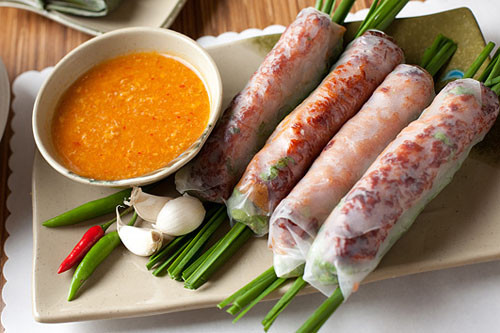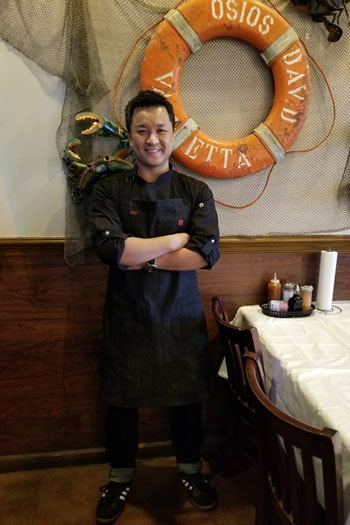Vietnamese people add color to the American culinary scene
Opening a restaurant to cook hometown dishes is a viable option for many Vietnamese immigrants in the US to support themselves and their families.
 |
Grilled spring rolls at Brodard restaurant in Garden Grove, north of Orange County, California, USA. Photo: KCET Food. |
Scenes of long lines of diners occur regularly in front of the Vietnamese restaurant "Brodard" located in the Little Saigon area, in Garden Grove city, north of Orange County, California state., America. They come here to enjoy Vietnamese cuisine, including the restaurant's most famous dish, "grilled spring rolls" with fish sauce, decoratedKCET Food reported.
After many years of building, tbrandBrodard currently has three successful restaurants. However, sheChau Dang-Haller, 46, co-founderBrodard said opening a restaurant was not her and her sister's dream when they arrived in the United States in 1986.
FatherDang-Haller's mother, continuing a three-generation banh mi tradition in Vietnam, opened a small shop in the US to earn money to send her children to school.
"Like other Vietnamese families, back then, we did business just to survive in America, to work and raise our children to have a good education."Dang-Haller recalls.
Her storyDang-Haller is quite popular among the Vietnamese community residing in the US. Many families, when struggling to make a living in a foreign land, have chosen to open restaurants to cook dishes with the flavors of their homeland.
"Vietnamese immigrants, regardless of their social status in their homeland, often join the working class in the United States, especially in the early stages of their arrival," said Phuong Nguyen, author of several books on the Vietnamese community in the United States.Restaurant business becomes one of the most viable ways to "make a living".
“The beauty of opening a restaurant is that it doesn’t require a lot of training, almost no qualifications or professionalism, at least in the short term,” says Phuong Nguyen.
According toErica J. Peters, director of the Center for Culinary Cultures in Southern California, says immigrants miss the flavors of home-cooked food and share recipes or tell each other where to find ingredients.Then they encourage and connect with each other to build a network in the community to help them open shops, providing typical ingredients of their hometown.
Binh Nguyen opened the first Pho Hoa restaurant in San Jose, which has now grown into a chain of 70 restaurants in many countries around the world.
"After the wave of immigration in 1980, we wanted to create a warm feeling and a taste of home for Vietnamese immigrants," said Quoc Phan, 38, owner of the "Pho Hoa" chain.
Traditional and modern
 |
John Nguyen, 38, owns the Cajun Kitchen restaurant in Houston, Texas. Photo: KCET Food. |
As of 2014,according to the Migration Policy Institute,There are 1.3 million Vietnamese immigrants living in the United States, most of whom live in the cities of Los Angeles, San Jose and Houston, where the warm, sunny climate and proximity to the sea are favorable for fishing.
John Nguyen, 38, owner of Cajun Kitchen in Houston, Texas, said that after Hurricane Katrina in 2005, a wave of Vietnamese people from New Orleans moved to Houston to resettle. The rapid increase in Vietnamese people led to the mushrooming of restaurants selling crawfish that blend local flavors with Vietnamese cuisine. Crawfish pots prepared in the style of the stateRich Louisiana garlic butter now flavored with the sourness of lemon and the aroma of lemongrass.
"The Vietnamese-flavored crawfish, or Viet-Cajun, craze in Houston probably started around 2000-2001. There were only one or two restaurants then and there wasn't much competition for the next four or five years," John Nguyen said. However, things changed completely in 2005 when new restaurants sprung up.
John, an accountant in the oil and gas industry, bought Cajun Kitchen in 2013 from the previous owner, who was also of Vietnamese descent. John is confident that the Vietnamese-flavored crawfish dish is "unique", "one of a kind" and unlike any Cajun recipe in the books.
Meanwhile, Ms. Vuong, owner of Lilly's Cafe restaurantin New Orleans, but insisted on cookingdishes are purely Vietnamese, not hybrid or mixed with cuisine from other cultures. Her restaurant has often welcomed famous culinary experts in the US. Every year, Ms. Vuong and her husband, chef Kiet Le, return to Vietnam to update on changes in the way pho is cooked in their homeland.
"Anyone can cook pho, but not everyone can cook pho well because this is a dish that requires perseverance and dedication. It's not as simple as boiling a few bones with water and calling it 'pho'," Ms. Vuong emphasized.
In addition to her strong love for traditional Vietnamese cuisine, Ms. Vuong said that New Orleans is a center of large Vietnamese families, which means there are many housewives with the skills of a super chef who cook delicious meals every day, creating a group of diners who are meticulous and picky when going to Vietnamese restaurants.
“So when you go out to eat at a restaurant, you expect the food to taste the same or better (than food cooked at home). If it doesn’t, you won’t go to that restaurant again,” Ms. Vuong said.
However, young people like Dang-Haller believe that cuisine is like fashion, chefs must follow trends, always innovate and create their own identity. According toDang-Haller, that's why the restaurantBrodard has been successful like this for many years. For example, about 10 years ago, when pan-seared yellowfin tuna suddenly became a "fever" in the US, the chef ofBrodard quickly caught up with customer demand and used this fish as the filling for spring rolls instead of pork like the traditional type.
Whether loyal to tradition or quick to embrace trends, all Vietnamese restaurant owners believe that the key to their success is hard work.
"As immigrants, we understand that if we drop out of school, if we don't work hard, we won't be able to survive,""We can't expect anyone to give us anything for free, like your parents are rich and leave you this or that inheritance," Dang-Haller said.
Ms. Vuong believes that in addition to diligence and hard work, "family is the foundation for everything."
According to VNE
| RELATED NEWS |
|---|


